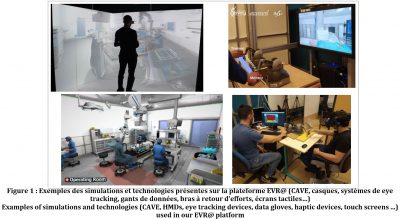Sujet : «Concevoir des environnements virtuels éducatifs pour améliorer les comportements de cybersécurité des humains en situation de travail »
Mots clé : Réalité Virtuelle, Interactions multimodales, Interactions collaboratives, compagnonnage, formation médicale
Contexte
Ce stage s’inscrit dans les domaines de l’interaction homme machine et de la réalité virtuelle (RV) appliqués à la formation professionnelle. Il vise à explorer l’utilisation des technologies de la réalité virtuelle pour sensibiliser les professionnels aux problèmes de cybersécurité et de modifier leur comportement. Il sera réalisé dans le cadre du projet DRIFT-HF (Digitization – Risks, Uncertainties and Fragility of Technologies related to the Human Factors) financé par l’Agence Nationale de la Recherche (ANR) en collaboration avec la Fondation Saint-Cyr, l’IRBA, l’UTC, PSYCLE et le l’InCIAM.
Problématique
La pandémie de la Covid-19, en réduisant les échanges physiques, a entraîné des pics inédits en matière d’usages numériques et d’atteintes à la sécurité des données. L’internet des objets, le big data, la mobilité et le télétravail amplifient les risques en termes de cybersécurité. La santé et la Défense présentent des similitudes de contraintes et d’usages digitaux dont le besoin d’assurer la fiabilité et la confidentialité des données. Par une approche transversale (enjeux cognitifs, sociaux, techniques, éthiques et juridiques) de la sécurisation, de la conception jusqu’aux usages, l’objectif du projet DIFT-HF est de démontrer l’intérêt de considérer l’homme comme un membre à part entière d’un système complexe devant s’adapter à ses vulnérabilités pour accroître sécurité et résilience des systèmes. Il s’agira notamment d’utiliser les technologies de la réalité virtuelle immersive pour construire un programme éducatif ciblé permettant de faire évoluer les comportements des utilisateurs.
L’objectif du présent stage est d’explorer l’usage de la réalité virtuelle pour la sensibilisation des professionnels aux problèmes de cybersécurité et de concevoir un premier prototype du système en suivant une approche centrée utilisateur.
Travail à réaliser
- Réaliser une étude de l’état de l’art du domaine,
- Participer à la réalisation des études sur le terrain pour mieux cerner les besoins des utilisateurs,
- Concevoir des premiers prototypes du système,
- Réaliser des évaluations préliminaires des prototypes développés et formuler des recommandations pour la conception de ce type d’environnements,
- Publier les résultats dans une conférence nationale ou internationale.
Compétences et qualités requises
Niveau M2 ou dernière année en école d’Ingénieur, Bonne maîtrise de la conception/programmation (si possible Unity/C#), connaissance des interactions naturelles, de la réalité virtuelle, de la méthodologie de conception centrée utilisateur, avoir un goût pour la recherche, le travail d’équipe et les échanges pluridisciplinaires.
Conditions du stage
Le stage se déroulera au laboratoire IBISC. Une plateforme expérimentale (plateforme EVR@) et des environnements virtuels sont mis à disposition. Le stagiaire sera en interaction avec les autres doctorants et stagiaires de l’équipe. Il/elle sera également convié à participer à certaines réunions avec les partenaires du projet et à faire des observations sur le terrain.
Durée : 6 mois (entre février et octobre 2022, selon disponibilités) Gratification minimale légale (environ 560€/mois)
Un financement est disponible pour poursuivre ces travaux en thèse de doctorat pour un excellent(e) candidat(e).
Contact
Merci de faire parvenir une lettre de motivation, un CV, les relevés de notes du Master 1 et/ou Master 2, et deux lettres de recommandations recherche à :
Amine CHELLALI Laboratoire IBISC EA 4526 – Equipe IRA2
01 69 47 75 33 Bâtiment Pelvoux 2, IUP
40, Rue du Pelvoux https://www.ibisc.univ-evry.fr Courcouronnes 91020 EVRY
Title: Designing educational virtual environments to improve human’s cybersecurity behaviors in work situations
Keywords Virtual Reality, cybersecurity, collaborative interactions, training, human factors
Context
This internship is in the fields of human machine interaction and virtual reality (VR) applied to professional training. It aims to explore the use of immersive virtual reality technologies to train professionals regarding cybersecurity issues and to change their behavior. This is part of the DRIFT-HF project (Digitization – Risks, Uncertainties and Fragility of Technologies related to Human Factors) funded by the National Research Agency (ANR) in collaboration with Saint-Cyr Foundation, IRBA, UTC, PSYCLE, and InCIAM.
Research problematic
The Covid-19 pandemic, by reducing physical exchanges, led to unprecedented peaks in digital usage and data security breaches. The Internet of Things, big data, mobility, and teleworking amplify the risks in terms of cybersecurity. Healthcare and Defense present similarities in terms of constraints and digital uses, including the need to ensure the reliability and confidentiality of data. Through a transversal approach (cognitive, social, technical, ethical, and legal issues) to security, from design to use, the objective of the DRIFT-HF project is to demonstrate the value of considering the human as a full-fledged member of a complex system that must adapt to its vulnerabilities to increase the security and resilience of systems. This will include using immersive virtual reality technologies to build a targeted educational program to help change users’ behavior.
The objective of this internship is to explore the use of virtual reality technologies to train professionals dealing with cybersecurity issues and to design a first prototype of the system following a user-centered approach.
Work description
- Conducting a literature review of the research field,
- Participate in carrying out field studies to better understand the user needs,
- Design the first prototypes of the system,
- Design interaction techniques based on this model,
- Carry out preliminary user studies on the prototypes and extract recommendations for the design of this type of environments,
- Publishing the results in a national or an international conference.
Qualifications
Master 2 or last year in an engineering school, good experience with HCI, UI design and programming (Unity 3D/C#), knowledge in natural interactions, virtual reality, user-centered design, high interest in research, teamwork, and multidisciplinary work.
Work conditions
The work will be carried out within the IRA² team at the IBISC Lab. An experimental platform (EVR@) and existing virtual environments will be available. The trainee will be in constant interaction with the team’s PhD students and other interns. He/she will also be invited to participate in research meetings with the project partners and to conduct field studies.
Duration: 6 months (ranging from Feb to Oct 2022)
Compensation: minimum legal compensation (around 560€/month)
Funding is available to continue this research work in a PhD thesis for an excellent candidate.
Contact
Please send your application letter, a CV, two research recommendation letters, and Master transcripts (M1/M2) to:
Amine CHELLALI Laboratoire IBISC EA 4526 – Equipe IRA2
01 69 47 75 33 Bâtiment Pelvoux 2, IUP
40, Rue du Pelvoux https://www.ibisc.univ-evry.fr Courcouronnes 91020 EVRY
References
- Chellali A, Mentis H, Miller A, Ahn W, Arikatla V, Sankaranarayanan G, Schwaitzberg S, Cao C (2016) Achieving Interface and Environment Fidelity in the Virtual Basic Laparoscopic Surgical Trainer. IJHCS 96: 22–37
- Švábenský, V., Vykopal, J., &Čeleda, P. (2020, February). What are cybersecurity education papers about? A systematic literature review of SIGCSE and ITICSE conferences. In Proceedings of the 51st ACM Technical Symposium on Computer Science Education (pp. 2-8).
- Ricci,J., Breitinger,F.,& Baggili,I.(2019). Survey results on adults and cybersecurity education. Education and Information Technologies,24(1), 231-249.
- Parrish, A., Impagliazzo, J., Raj, R. K., Santos, H., Asghar, M. R., Jøsang, A., … &Stavrou, E. (2018, July). Global perspectives on cybersecurity education for 2030: a case for a meta-discipline. In Proceedings Companion of the 23rd annual ACM conference on innovation and technology in computer science education (pp. 36-54).
- Stevens, R. (2017). Identifying self-inflicted vulnerabilities: The operational implications of technology within US combat systems. In 2017 International Conference on Cyber Conflict (CyCon US) (pp. 112-118). IEEE.
- Ortiz, E. C., & Reinerman-Jones, L. (2015, August). Theoretical foundations for developing cybersecurity training. In International Conference on Virtual, Augmented and Mixed Reality (pp. 480-487). Springer, Cham.
- Jin, G., Tu, M., Kim, T. H., Heffron, J., & White, J. (2018). Evaluation of game-based learning in cybersecurity education for high school students. Journal of Education and Learning (EduLearn), 12(1), 150-158.
- Seo, J. H., Bruner, M., Payne, A., Gober, N., &McMullen, D. (2019). Using virtual reality to enforce principles of cybersecurity. The Journal of Computational Science Education, 10(1).
- Kasurinen, J. (2017). Usability issues of virtual reality learning simulator in healthcare and cybersecurity. Procedia computer science, 119, 341349.
- Skorenkyy, Y., Kozak, R., Zagorodna, N., Kramar, O., & Baran, I. (2021, March). Use of augmented reality-enabled prototyping of cyber-physical systems for improving cyber-security education. In Journal of Physics: Conference Series (Vol. 1840, No. 1, p. 012026). IOP Publishing.
- Date de l’appel : 06/12/2021
- Statut de l’appel : Pourvu
- Contact coté IBISC : Amine CHELLALI (MCF Univ. Évry, IBISC équipe IRA2) amineDOTchellaliATuniv-evryDOTfr
- Sujet de stage niveau Master 2 (format PDF)
- Web équipe IRA2
- Plate-forme EVR@






